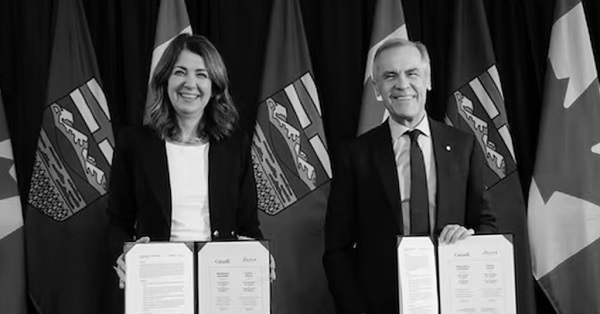Alberta
Construction of Cancer Centre in Calgary on budget and on time

From the Province of Alberta
Calgary Cancer Centre creates jobs in Calgary
The Calgary Cancer Centre is creating more than 8,770 well-paying construction and construction-related jobs in the Calgary region.
This project is one of the largest job creators in Alberta and a key part of Alberta’s Recovery Plan to build and create jobs. Construction continues to be on budget and on time despite the challenges of the COVID-19 pandemic.
“Thank you to the construction workers who have closely followed COVID-19 guidelines to keep everyone safe, job sites open and this important project on schedule. These efforts will help get Albertans back to work and this much-needed project finished, delivering world-class cancer treatment for Calgarians.”
“The ongoing construction progress at the Calgary Cancer Centre means this 127,000 square metre facility will open to patients in 2023 to provide top-quality cancer care in a healing space. Thanks to all the workers for their hard work and adherence to public health guidelines.”
“The project is an enormous collaborative effort. More than 1,300 people are currently working on-site, including plumbers, electricians, drywallers, elevator installers, painters and inspectors. Dozens of Calgarians work off-site as well, including design consultants, suppliers, and those manufacturing millwork and doorframes and fabricating panels. We’re exceptionally proud of the progress so far.”
Project facts
- $1.42 billion project
- Average of 1,300 workers on-site per day
- Four million hours of accumulated on-site work (as of Aug. 31)
- Project construction – began in late 2017 and is expected to be completed in late 2022
- Operational commissioning (preparing for opening) – 2023
- Ready for clinical use 2023 (anticipated)
Infrastructure projects like the Calgary Cancer Centre are an integral part of the government’s economic recovery strategy to get Albertans back to work.
Alberta’s Recovery Plan is a bold, ambitious long-term strategy to build, diversify, and create tens of thousands of jobs now. By building schools, roads and other core infrastructure we are benefiting our communities. By diversifying our economy and attracting investment with Canada’s most competitive tax environment, we are putting Alberta on a path for a generation of growth.
Quick facts
- This project is part of the more than $10 billion infrastructure spending announced as part of Alberta’s Recovery Plan.
- This spending includes:
- $6.9 billion Budget 2020 capital spending
- $980 million accelerated for Capital Maintenance and Renewal
- $200 million for Strategic Transportation Infrastructure Program and water infrastructure projects
- $600 million in strategic infrastructure projects,
- $500 million in municipal infrastructure
- $1.5 billion for Keystone XL.
Alberta
This new Canada–Alberta pipeline agreement will cost you more than you think


Canada and Alberta’s new net-zero energy deal is being promoted as progress, but it also brings rising costs. In this video, I break down the increase to Alberta’s industrial carbon price, how those costs can raise fuel, heating, and grocery prices, and why taxpayer-funded carbon-capture projects and potential pipeline delays could add even more. Here’s what this agreement could mean for Canadians.
Watch Nataliya Bankert’s latest video.
Alberta
Alberta will defend law-abiding gun owners who defend themselves

Alberta’s government will introduce a motion under the Alberta Sovereignty within a United Canada Act to defend law-abiding firearms owners.
A new motion under the Alberta Sovereignty within a United Canada Act will, if passed by the legislature, instruct all provincial entities, including law-enforcement agencies such as municipal police services and the RCMP, to decline to enforce or implement the federal gun seizure program. The motion also makes clear that Albertans have the right to use reasonable force to defend themselves, their families and their homes from intruders.
This builds on the steps Alberta has already taken to reduce crime, strengthen public safety and assert provincial jurisdiction over firearms. This includes passing the Alberta Firearms Act to establish the Alberta Chief Firearms Office, along with the Alberta Firearms Regulation and the Seizure Agent and Provider Licensing Regulation.
“It’s time for Ottawa to stop targeting the wrong people. Albertans have the right to protect their homes and their families. No one should hesitate to defend themselves when faced with a threat at their own doorway. Law-abiding citizens, hunters, farmers and sport shooters are not the source of violent crime, yet the federal government wants to confiscate their property while illegal guns pour across our borders. Alberta will not stand by while responsible gun owners are treated like criminals. This motion is about using every legal tool we have to protect their rights, uphold public safety and push back on federal overreach into provincial jurisdiction.”
“When someone breaks into your home, the law recognizes that you have enhanced rights to protect yourself and your family. Alberta is making that principle unmistakably clear: lawful, reasonable self-defence will be respected, not criminalized.”
“As an experienced former law enforcement officer, law-abiding gun owners have never been an issue, in my own personal experience, nor has there been any data to support that law-abiding gun owners are the ones that are committing violent gun crimes. The illegal guns that you see being used by criminals are typically being smuggled in from the United States. The federal government should help us strengthen the border, helping us to stop illegal guns from coming into Canada. This would further enhance safety and security for the people of Alberta and Canada as opposed to going after lawful gun owners.”
Under the Alberta Firearms Regulation, municipalities, law enforcement and police commissions must obtain approval from Alberta’s Minister of Justice before accepting funding to participate in the Assault-Style Firearms Compensation Program.
“Misguided federal initiatives such as the handgun transfer ban and the Order in Council firearms prohibitions of 2020, 2024 and 2025 have had a devastating impact on the safe, legitimate activities of the firearms community and the businesses that support it, while having no discernible effect on criminal activity. I am proud to see that the Alberta government is pushing back and supporting lawful firearms owners through these measures.”
“Licensed gun owners and all Albertans can rest assured that their government, under the leadership of the UCP, is laser focused on protecting law abiding citizens while prioritizing real public safety.”
“The Alberta Hunter Education Instructors Association will continue to support our government and the Alberta chief firearms officer in our joint quest to use safety training and education as the key tools to ensure we have safer streets and communities. Safe and responsible use of firearms in Alberta is a key part of our heritage, culture, and our rich and precious heritage.”
Key facts:
- Pursuant to the Attorney General’s recent guidance protocols, Alberta’s prosecutors will decline to prosecute offences under the federal gun seizure program when it is not in the public interest.
- The Attorney General’s recent guidance protocol directs prosecutors to not prosecute home defence offences when it is not in the public interest.
- Total spending on the federal Assault-Style Firearms Compensation Program is expected to exceed $750 million.
- The firearms motion considers the Alberta Bill of Rights, the Constitution Act, 1867 and the Criminal Code.
- Currently 10 per cent of adult Albertans are licenced to use and own firearms. There are 381,900 firearms licences in Alberta.
- Alberta has 638 licensed firearms businesses, 138 shooting ranges and 91 shooting clubs.
-

 Business2 days ago
Business2 days agoWhy Isn’t There a Cure for Alzheimer’s Disease?
-

 Brownstone Institute2 days ago
Brownstone Institute2 days agoThe Unmasking of Vaccine Science
-

 armed forces2 days ago
armed forces2 days agoGlobal Military Industrial Complex Has Never Had It So Good, New Report Finds
-

 Alberta2 days ago
Alberta2 days agoEmissions Reduction Alberta offering financial boost for the next transformative drilling idea
-

 Business1 day ago
Business1 day agoRecent price declines don’t solve Toronto’s housing affordability crisis
-

 Censorship Industrial Complex20 hours ago
Censorship Industrial Complex20 hours agoA Democracy That Can’t Take A Joke Won’t Tolerate Dissent
-

 Artificial Intelligence1 day ago
Artificial Intelligence1 day agoThe Emptiness Inside: Why Large Language Models Can’t Think – and Never Will
-

 Daily Caller1 day ago
Daily Caller1 day agoTech Mogul Gives $6 Billion To 25 Million Kids To Boost Trump Investment Accounts









